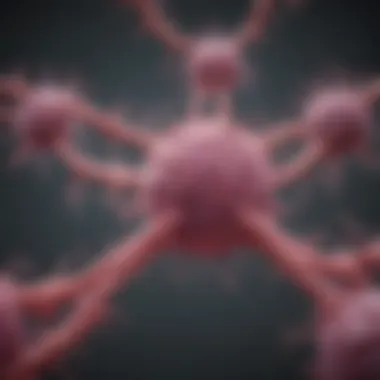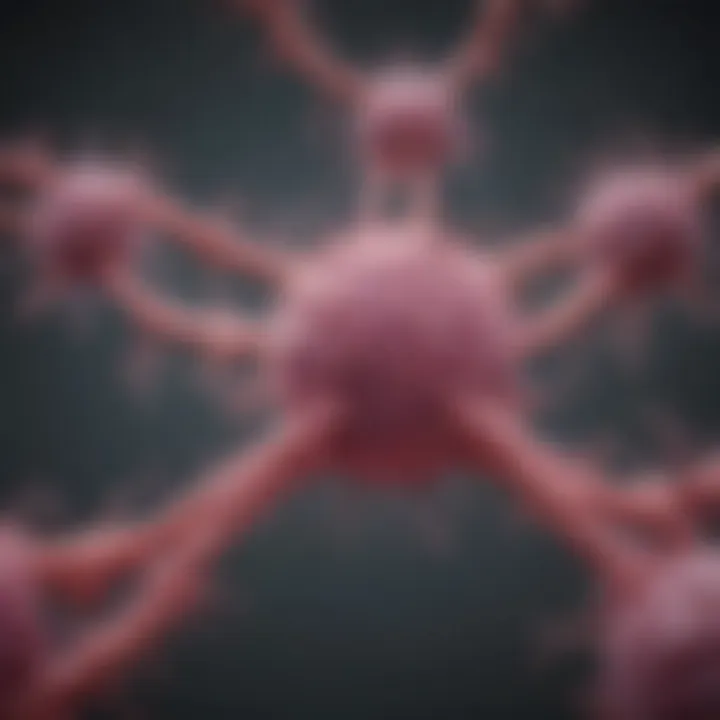Understanding Stress's Role in Breast Cancer Recurrence


Intro
The relationship between stress and breast cancer recurrence is complex and multifaceted. Understanding how psychological factors influence physical health outcomes is critical. Breast cancer affects millions of women globally, and its recurrence can have devastating implications. This exploration aims to present a detailed look at the intersection of stress and breast cancer recurrence.
Key Findings
Major Results
Numerous studies indicate a direct correlation between high levels of stress and increased recurrence rates of breast cancer. Stress, particularly chronic emotional stress, can alter hormonal levels and immune responses, impacting cancer progression. Some key findings include:
- Increased Cortisol Levels: Stress often leads to elevated cortisol, a hormone linked to enhanced tumor growth.
- Inflammatory Responses: Constant stress may trigger persistent inflammation, which is a known factor in cancer development.
- Behavioral Changes: Stress can lead to unhealthy behaviors such as smoking, poor diet, and lack of exercise, all of which may exacerbate cancer risks.
Discussion of Findings
The evidence suggests that managing stress can be critical in improving outcomes for patients dealing with breast cancer. Holistic management approaches that include psychological support and lifestyle changes could help in reducing recurrence rates. Additionally, empowering patients with coping strategies for stress can provide them with a sense of control and potentially improve overall health outcomes.
"The mind and body are interconnected. Addressing mental health alongside physical health could be crucial in cancer care."
Methodology
Research Design
This article synthesizes data from various clinical studies and research papers. The majority of studies reviewed were longitudinal in nature, providing insight into how stress impacts breast cancer recurrence over time.
Data Collection Methods
Data was collected through a combination of surveys, interviews, and clinical trials. Patients undergoing treatment for breast cancer were monitored for stress levels through psychological assessments, cortisol measurement, and self-reported questionnaires about their mental health and coping strategies. This multifaceted approach allows for a comprehensive understanding of the intricate relationship between stress and breast cancer recurrence.
Prelims to Breast Cancer Recurrence
Understanding breast cancer recurrence is essential. It helps patients, families, and healthcare providers address a significant aspect of cancer care. Recurrence signifies a return of cancer after treatment. This return can occur in the same location or spread to other areas.
Breast cancer recurrence can impact not only physical health but emotional wellness as well. Stress, a common experience among survivors, can influence recurrence rates. Recognizing this link shapes how we view treatment and recovery.
Definition of Breast Cancer Recurrence
Breast cancer recurrence refers to the return of cancer after a period of remission. This means that despite initial treatment, cancer cells remain and can grow again. Recurrence can happen months or even years after the successful treatment.
Types of Recurrence
There are three primary types of recurrence in breast cancer:
- Local Recurrence: This occurs in the original location of the tumor.
- Regional Recurrence: This involves nearby lymph nodes.
- Distant Recurrence: This indicates that cancer has metastasized to other parts of the body.
Local Recurrence
Local recurrence presents a unique challenge. It means that cancer cells have returned to the site of the original tumor. This emphasizes the importance of careful monitoring after treatment. The key characteristic of local recurrence is its proximity to the initial cancer site. For many patients, local recurrence could suggest a need to adjust treatment or surveillance strategies. While it can be distressing, detecting this early may lead to better outcomes.
Regional Recurrence
Regional recurrence often involves nearby lymph nodes. It is essential to note that this type of recurrence can impact nearby tissues and organs. The key characteristic of regional recurrence is that it indicates a broader scope of disease. This highlights the interconnectedness of bodily systems. One downside is that the presence of cancer in lymph nodes can indicate a more aggressive disease. However, treatment options may still be effective, depending on the individual case.
Distant Recurrence
Distant recurrence refers to cancer spreading beyond the breast and regional lymph nodes, often to organs such as the liver, lungs, or bones. This type of recurrence can be particularly concerning. The key aspect is its indication of advanced disease. Patients may face a more complex treatment landscape with distant recurrence, including systemic therapies. Understanding this type is essential for tailoring follow-up care and setting realistic treatment goals.
Statistics on Recurrence Rates
Statistics provide clarity on recurrence rates, which vary significantly based on several factors.
- Approximately 30% of patients may experience a recurrence within 10 years after initial treatment.
- Risk factors include tumor size, grade, and hormone receptor status.
- Understanding these rates helps shape patient expectations and therapeutic interventions.


Overall, comprehending breast cancer recurrence, including its definitions and types, is pivotal for effective patient management. This understanding enhances care strategies and promotes informed decision-making, ultimately leading to better survival outcomes.
Understanding Stress
Understanding stress is critical to this article because it establishes a foundation for linking psychological factors to breast cancer recurrence. Stress affects individuals in unique ways, influencing mental well-being and physical health significantly. By examining stress, we can better grasp its multifaceted role in cancer pathology. This exploration is not merely academic; it carries practical benefits for patients, healthcare providers, and researchers alike, as effective stress management can mitigate some complications related to cancer treatment.
Definition and Types of Stress
Stress is a psychological and physical response to perceived challenges or threats. The experience of stress can range from brief episodes to chronic conditions that last for extended periods. There are two primary types of stress to consider: acute stress and chronic stress.
Acute Stress
Acute stress is characterized by a short-term reaction to an immediate threat or challenge. This form of stress can arise from various situations, such as a public speaking engagement or an unexpected life event. It is a common response, and its usefulness stems from the body's ability to manage pressing conflicts effectively. Key characteristics of acute stress include heightened awareness and focus. While acute stress can be helpful, it can also lead to negative outcomes if it becomes too frequent.
Advantages of acute stress in this context involve its ability to heighten alertness and promote quick decision-making. However, its disadvantage lies in the potential for mismanagement, which can lead to persistent anxiety.
Chronic Stress
Chronic stress, on the other hand, persists over long periods. This type can stem from ongoing issues, such as a demanding job, financial difficulties, or relational problems. Its key characteristic is that it gradually wears down the body's systems. Chronic stress is relevant for understanding breast cancer recurrence, as prolonged stress can have disabling effects on the immune system and overall health.
Chronic stress can offer an insight into the risks associated with long-term psychological distress. While it indicates deep-rooted issues needing resolution, its disadvantage is that it often requires professional intervention to manage properly.
Causes of Stress
Stress can emanate from various sources. Environmental factors, lifestyle choices, and personal relationships can all contribute. Common causes of stress include:
- Work-related pressures
- Family responsibilities
- Financial concerns
- Major life changes, such as divorce or relocation
- Health issues
Individuals may react differently to the same stressors, highlighting the subjective nature of stress responses. Understanding these causes can assist in developing targeted interventions.
Physiological Response to Stress
The body's physiological response to stress is complex and involves several systems working in unison. Two critical components of this response are the HPA axis and the production of corticosteroids.
The HPA Axis
The HPA axis stands for the hypothalamus-pituitary-adrenal axis. This system plays an essential role in regulating stress responses. When faced with a stressor, the hypothalamus releases corticotropin-releasing hormone (CRH), prompting the pituitary gland to release adrenocorticotropic hormone (ACTH). This leads to the adrenal glands producing cortisol. The key characteristic of the HPA axis is its ability to balance energy and resources during stressful times. This balance, however, can disrupt the immune system if stress becomes chronic.
The HPA axis highlights an intricate connection between environmental stressors and physiological change. Its disadvantage lies in the fact that dysregulation can lead to various health issues, including increased susceptibility to diseases like cancer.
Corticosteroids and Immune Response
Corticosteroids are hormones produced by the adrenal glands based on signals received from the HPA axis. They serve several functions, including regulating inflammation and immune responses. A key characteristic is that they help the body respond to stress by limiting inflammation, which can be beneficial in the short term. However, prolonged elevations in corticosteroid levels can diminish immune function, which is crucial for cancer patients.
The unique feature of corticosteroids is their dual role; they protect during acute stress but can impair health in the long run. Therefore, understanding their fluctuations offers insight into potential risks related to breast cancer recurrence.
Understanding these aspects of stress can illuminate the pathways through which stress influences health, especially in individuals with a history of breast cancer.
This section provides a background that influences the overarching topic of breast cancer recurrence. The impact of stress, whether acute or chronic, interlaces with biological responses that affect immune function and inflammation. This exploration sets the stage for comprehending the empirical evidence presented later.
Stress and Cancer: Biological Mechanisms
Understanding the biological mechanisms linking stress to cancer is vital. Stress does not merely affect mental well-being; it can induce significant physiological changes that may contribute to breast cancer recurrence. Both systemic and cellular alterations occur due to stress, which can impair immune function and promote a conducive environment for cancer progression. By exploring these mechanisms, we identify areas that could benefit from targeted interventions and stress-management strategies, leading to improved treatment outcomes for breast cancer patients.
Impact of Stress on Immune Function
Stress can have profound effects on the immune system. When an individual experiences stress, the body triggers a cascade of hormonal responses. The hypothalamic-pituitary-adrenal (HPA) axis becomes activated, releasing glucocorticoids such as cortisol. High levels of cortisol can inhibit certain immune responses. This immunosuppression can lead to an inability to detect and destroy cancer cells effectively. The diminishment of immune surveillance plays a crucial role in enhancing the likelihood of tumor formation and recurrence among breast cancer survivors.
Stress-Induced Inflammation
Inflammation is another critical aspect associated with stress. Prolonged stress results in the release of pro-inflammatory cytokines. These substances can create a chronic inflammatory state, which is associated with various cancers, including breast cancer. Chronic inflammation can lead to the promotion of tumor growth and proliferation. Moreover, the links between inflammation and cancer progression further emphasize the need to manage stress effectively in breast cancer patients.


Hormonal Changes Linked to Stress
Hormonal fluctuations greatly influence breast cancer outcomes. Stress alters how hormones behave in the body, triggering changes that may worsen cancer. Two critical hormones affected by stress are cortisol and estrogen.
Cortisol Levels
Cortisol is often termed the stress hormone for its role in the body's stress response. Elevated cortisol levels are characteristic of chronic stress and can deter immune function. This immunosuppression provides an advantageous environment for cancer cells to thrive. Understanding cortisol's role is essential as its management might lead to enhanced immune responses. Therefore, targeting cortisol levels is a worthwhile endeavor in cancer care strategies.
Estrogen Production
Stress can also influence estrogen production. Elevated stress levels may lead to an increase in estrogen, a hormone that plays a significant role in breast cancer development. Research indicates that higher estrogen levels can stimulate growth in estrogen-sensitive breast tumors. Therefore, managing stress could potentially regulate estrogen levels, contributing to better outcomes in breast cancer recurrence. Monitoring estrogen production is crucial as it highlights another avenue where stress might impact cancer recurrence.
Engaging in stress management techniques can replenish immune responses and regulate hormone levels, which is vital for breast cancer survivors.
Understanding these biological mechanisms is necessary for developing effective treatment and management plans for individuals affected by breast cancer. The connection between stress, immune function, inflammation, and hormones presents multiple opportunities for clinical interventions. By focusing on biological underpinnings, healthcare providers can better support patients navigating their cancer journeys.
Empirical Evidence: Stress and Breast Cancer Recurrence
Understanding the empirical evidence linking stress and the recurrence of breast cancer is essential for developing a well-rounded approach to treatment. This arena is especially significant in light of the ongoing discussions in oncology about the influences of psychological factors on physical health outcomes. The integration of stress management strategies into treatment plans can potentially enhance patient recovery and overall quality of life. Increased awareness of this interplay not only helps in the clinical setting but also empowers patients to take an active role in their health journey.
Review of Clinical Studies
Numerous clinical studies have sought to unravel the nuances of how stress contributes to breast cancer recurrence. Research indicates that stress may lead to alterations in immune function and hormonal levels, both critical factors in cancer progression. Several pivotal studies have shown that women who reported higher levels of stress had increased rates of recurrence compared to those with lower stress levels. For instance, a long-term study involving breast cancer survivors found that those experiencing high psychological distress had a recurrence rate significantly higher than their less stressed counterparts.
Moreover, investigations into biological markers related to stress reveal that physiological responses can have far-reaching influences on cancer survivorship. These markers often include cortisol levels and inflammatory cytokines, both of which can be elevated in chronic stress situations. Studies have consistently shown that elevated cortisol can impair immune response, reducing the body's ability to fend off cancer cell activity.
Correlation Between Stress Levels and Recurrence
The correlation between stress levels and breast cancer recurrence underscores the need for comprehensive care. Meta-analyses have unveiled a striking trend: as psychological stress increases, the risk of cancer recurrence escalates. Stress may hinder the effectiveness of treatment and contribute to poorer outcomes.
Research has utilized various methodologies, from self-reported stress scales to biological assessments, establishing a strong link between stress and recurrence rates.
- Studies illustrate that stress levels can directly affect the psychoneuroimmunology pathway, having implications for cancer biochemistry.
- Increased stress levels often coincide with less engagement in recommended lifestyle changes, which, in turn, can exacerbate health outcomes.
Given this backdrop, understanding individual experiences with stress not merely as an emotional burden but as a tangible factor affecting remission becomes crucial.
Patient Testimonials and Anecdotal Evidence
While clinical data provide a foundation for understanding the link between stress and recurrence, patient testimonials and anecdotal evidence enrich this narrative. Survivors often share their journeys, emphasizing how emotional experiences shaped their healing processes. Many recount the immediate stressors faced post-diagnosis, including fear of recurrence and pressure from societal expectations. As a result, the importance of psychological resilience emerges as a salient theme.
Patients have reported engaging in various coping mechanisms, from mindfulness practices to support group participation. These accounts highlight that a proactive stance towards stress management can steer individuals towards positive outcomes. The combination of personal insights and clinical findings fosters a more holistic view, reaffirming the necessity for supportive networks and mental health resources as integral parts of cancer care.
"Stress may seem intangible, but it is a very real aspect of healing. The more we acknowledge it, the better equipped we become to manage our health."
— Breast cancer survivor
As research continues to evolve, combining quantitative studies with qualitative experiences promises to deepen our understanding of how stress influences breast cancer recurrence. This integration of data fosters urgent calls for interventions that not only address medical needs but also psychological well-being.
Mental Health and Support Systems
The intersection of mental health and support systems is crucial for patients facing breast cancer. This topic underscores the significant role psychological well-being plays in cancer treatment and recovery. Mental health affects not just the individual's emotional state but also their physical health and response to treatment, including potential cancer recurrence. Addressing psychological aspects thoughtfully can enhance resilience and improve overall health outcomes.
Psychological Impact of Breast Cancer Diagnosis
The diagnosis of breast cancer unleashes a myriad of emotions, ranging from disbelief to fear and anxiety. These responses can be profound and far-reaching. Many patients report feelings of isolation, especially if friends and family members cannot fully comprehend the challenges faced. This psychological burden can create significant distress, which may, in turn, impact treatment adherence and recovery.
Moreover, studies indicate that anxiety and depression are common among breast cancer patients. This can lead to cycles of stress that negatively affect the immune system and inflammation levels. The psychological struggles patients face often correlate with their overall treatment experience. Support systems become vital during this period. Having mental and emotional resources can make a real difference.
Role of Counseling and Support Groups
Counseling and support groups serve as essential components in managing the mental health challenges associated with breast cancer. Counseling offers a one-on-one environment where patients can express their feelings, fears, and concerns. This therapeutic space allows for coping strategies to be developed in a structured and supportive manner.
Support groups, on the other hand, provide a communal experience. Here, patients meet others on similar journeys, helping combat feelings of isolation. The shared experiences can foster a sense of belonging and understanding that is unparalleled. Group settings are beneficial for reinforcing hope and resilience. Advantages of these systems include:


- Emotional support from peers.
- Practical advice on managing symptoms and treatment side effects.
- Increased motivation to adhere to treatment plans.
Additionally, engaging in these support systems allows the sharing of personal experiences that provide new perspectives on navigating the challenges of cancer. For patients balancing psychological strains, leveraging these resources not only leads to better mental health but may also have implications on treatment outcomes, including recurrence.
Integrating Stress Management into Treatment Protocols
Integrating stress management into treatment protocols is a pivotal component in addressing the recurrence of breast cancer. As research highlights, psychological stress can significantly influence cancer progression and patient outcomes. Therefore, healthcare providers must prioritize stress management strategies alongside conventional treatments like chemotherapy or radiation. This approach aims to create a holistic treatment plan that acknowledges the psychological aspects of recovery, leading to better overall health outcomes.
Mindfulness and Relaxation Techniques
Mindfulness and relaxation techniques serve as effective tools for managing stress. Practices such as meditation, guided imagery, and deep-breathing exercises can help patients focus on the present moment and reduce anxiety. These methods can lower cortisol levels, which is beneficial since high cortisol is linked to stress-related immune suppression. Regular practice fosters a sense of calm and emotional resilience.
Specific benefits include:
- Improved emotional regulation
- Enhanced overall well-being
- Greater quality of life during recovery
Incorporating mindfulness into daily routines can facilitate long-term stress reduction, making it a valuable addition to treatment protocols. Research supports that patients who engage in mindfulness exhibit lower distress levels, positively affecting their physical health.
Cognitive Behavioral Therapy Applications
Cognitive Behavioral Therapy (CBT) is another vital component, focusing on altering negative thought patterns and behaviors. For breast cancer patients, CBT can provide coping mechanisms to handle the stress of diagnosis and treatment.
CBT sessions involve:
- Identifying unhelpful thoughts
- Challenging those thoughts
- Replacing them with more balanced views
The structured nature of CBT makes it an effective intervention for reducing anxiety and depression in cancer patients. Studies indicate that CBT decreases stress levels and can even reduce the risk of recurrence by improving patients' mental health.
By integrating mindfulness and CBT, treatment protocols become more comprehensive, addressing not only physical health but also mental resilience.
Future Directions in Research
The exploration of stress and breast cancer recurrence is not merely a retrospective analysis; it opens pathways for ongoing and future inquiry. As medical science continues to evolve, identifying new strategies to improve patient outcomes remains a focal point. The future directions in this area of research are crucial for advancing our collective understanding of the stress-cancer nexus. These new investigative pathways can offer significant benefits for patients battling breast cancer, particularly in terms of tailored treatments and holistic approaches.
Identifying Biomarkers for Stress and Recurrence Risk
A key aspect of future research involves identifying biomarkers for stress and the risk of breast cancer recurrence. Biomarkers can provide critical insight into how stress levels impact cancer progression. This can lead to more accurate predictions of recurrence risk.
- Biological Markers: Researchers are investigating various biological markers, such as cortisol levels, inflammatory cytokines, and genetic predispositions. These biomarkers can serve as indicators of the body's stress response.
- Risk Assessment: If stress-related biomarkers are accurately identified, they can be integrated into routine assessments. This could allow healthcare providers to better stratify patients according to their individual risk profiles.
- Targeted Interventions: Biomarkers can also pave the way for personalized treatment plans. For instance, if a specific biomarker signifies heightened stress, healthcare providers could introduce stress-reduction techniques as preventive measures against recurrence.
Trialing New Interventions
Trialing new interventions focused on stress management continues to gain traction within the research community. The effectiveness of these interventions must be rigorously evaluated to determine their real-world applicability and impact on recurrence rates.
- Psychological Interventions: Research is exploring various psychological strategies, such as mindfulness, cognitive-behavioral therapy, and supportive social networks. These strategies aim to mitigate stress and potentially lower the risk of recurrence.
- Clinical Trials: Structuring clinical trials to evaluate these interventions is essential. Ensuring diverse patient participation can help generate valuable data on their effectiveness across different demographics.
- Multidisciplinary Approaches: Future research should also consider integrating multiple disciplines. Combining oncology, psychology, and social work can cultivate a holistic view of patient care, providing comprehensive treatment.
As the scientific community delves deeper into this interconnectedness of stress and medical outcomes, the potential to enrich patient care and outcomes becomes more pronounced. Understanding stress not just as a psychological concern, but as a significant factor in cancer recurrence, illuminates pathways for innovative research and intervention.
In summary, focusing on identifying biomarkers and trialing new interventions enriches the field of breast cancer research. The integration of these elements is vital for developing comprehensive approaches to manage not just the disease but also the psychological and emotional landscapes of patients.
The End
The relationship between stress and breast cancer recurrence is a significant area of concern that deserves attention. This article brings together various strands of research supporting the connection between psychological stress and the biological mechanisms influencing cancer recurrence. Understanding these aspects can ultimately lead to more effective patient management and improved outcomes.
Summary of Key Findings
Recent studies have shown that chronic stress can adversely affect the immune system, potentially facilitating the recurrence of breast cancer. Key findings include:
- Impact on Immune Function: Elevated stress levels have been linked to decreased immune responses, which can hinder the body's ability to combat cancer cells.
- Inflammatory Responses: Stress triggers inflammation, a recognized promoter of cancer progression. This inflammation may pave the way for tumor growth and recurrence.
- Hormonal Interactions: Stress alters hormone levels, particularly cortisol and estrogen, which can influence the development of breast cancer.
These examples highlight the urgency of addressing stress management in breast cancer treatment.
Call for Comprehensive Care Approaches
It is clear that managing stress is essential in the holistic care of breast cancer patients. A comprehensive approach includes:
- Integration of Mental Health Services: Counseling and therapy should be included as part of the treatment regime for breast cancer patients to address psychological aspects of their health.
- Support Networks and Groups: Encouraging patients to build strong support systems can alleviate feelings of isolation and provide added emotional strength.
- Personalized Treatment Plans: Each patient's experience with stress should be considered when creating treatment strategies, emphasizing the unique psychological needs of individuals.
By adopting these practices, healthcare providers can enhance the quality of care, helping patients manage both their physical and emotional well-being effectively.



